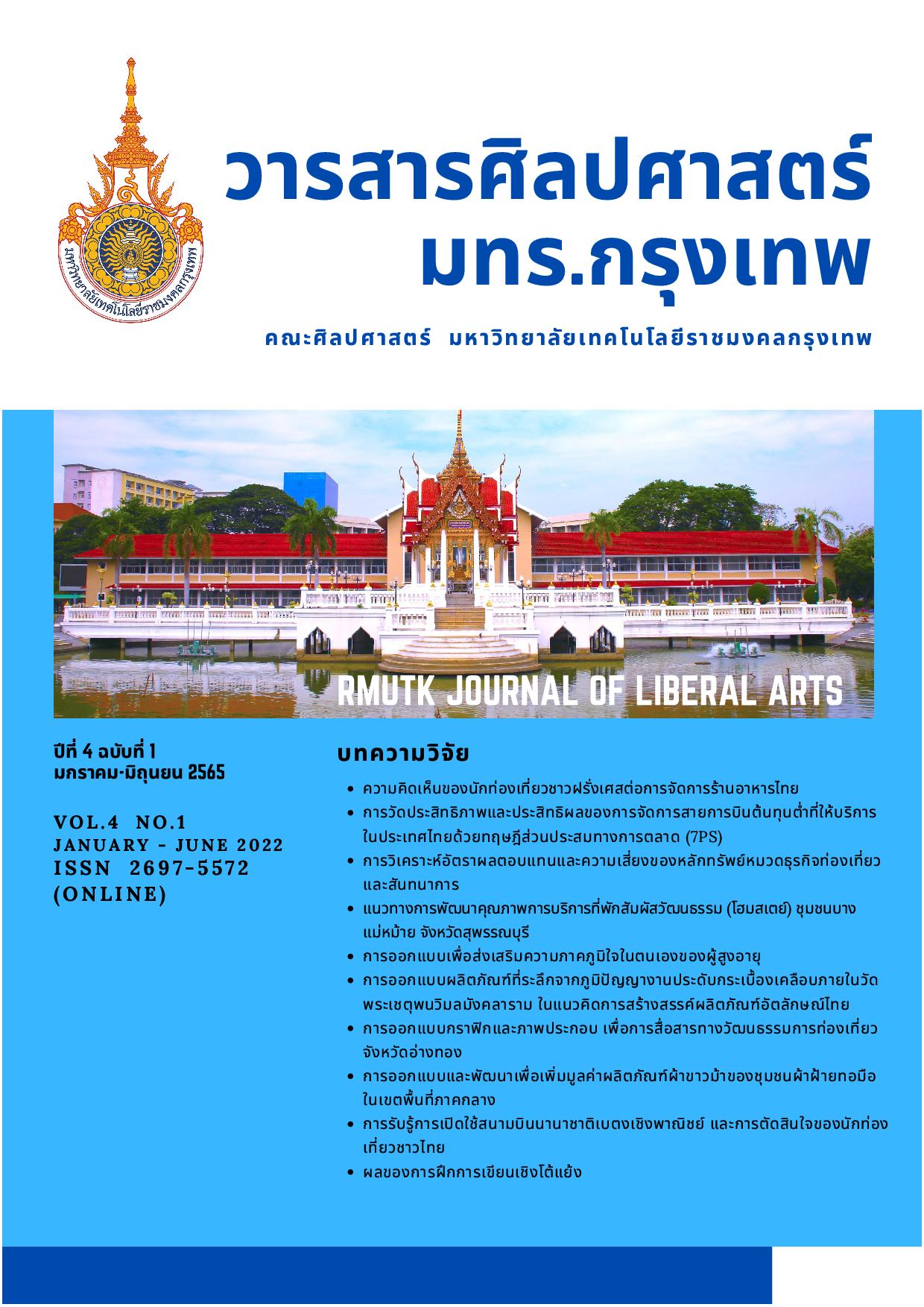APPROPRIATE DESIGN TO PROMOTE SELF-ESTEEM IN ELDERLY POPULATION
Main Article Content
Abstract
This article aims to study and collect the data of universal design principles to promote quality of life of elderly, and to be the guidelines to improve the potential of manufacturers and their local products. Qualitative research method was applied to conduct this research paper, in which data was collected from the samples of 100 elderly male and female populations in Nakhon Ratchasima. The simple sampling method is utilized to determine the sample size, at the tolerance of 10 according to Taro Yamane’s formula. Tools for the data collection include survey on the satisfaction of participants, which was implemented in 2 phases: 1) Online discussion and focus group on the production design for health product for elderly called “Gaow Goods: self-care for our age”; and 2) the evaluation of satisfaction. The results of the study revealed that the samples were interested in crayon drawing sets, bags, hats, watercolor painting sets, knitted balls, textile design kits, and hand pillows. None of the samples were interested in shoe design. The results can be categorized into 3 topics which are 1) physical restriction; 2) duration of development, and 3) personal preferences. Additionally, the satisfaction survey results from the online discussion revealed that: 1) the attractiveness and benefits for participants are at a high level (
=4.00); 2) benefits after participating in the activities are at a very high level (
=5.00); 3. the satisfaction towards activities arranged via LINE application and YouTube is at a very high level (
=5.00); 4. the satisfaction towards instructors during the lectures and Q&A session is at a very high level (
=5.00), and 5. the satisfaction towards the duration of activity is at a high level (
=4.00).
Article Details

This work is licensed under a Creative Commons Attribution-NonCommercial-NoDerivatives 4.0 International License.
References
กรมสุขภาพจิต. (2563). ก้าวย่างของประเทศไทย สู่‘สังคมผู้สูงอายุ’อย่างสมบูรณ์แบบ. สืบค้นจาก https://www.dmh.go.th/news-dmh/view.asp?id=30476
จารีย์ ปิ่นทอง, ธนภรณ์ จิตตินันทน์, ปภัสสร แสวงสุขสันต์, และณัคนางค์ กุลนาถศิริ. (2561). สังคมสูงวัยกับความท้าทายของตลาดแรงงานไทย. สืบค้นจาก https://www.bot.or.th/Thai/MonetaryPolicy/EconomicConditions/AAA/AgePeriodCohort.pdf
ณิชากร เมตาภรณ์. (2562). ปัญหาการกินยาในผู้สูงอายุ. สืบค้นจาก https://northnfe.blogspot.com/2019/08/blog-post_98.html
ประภาเพ็ญ สุวรรณ และ สวิง สุวรรณ. (2536). พฤติกรรมศาสตร์ พฤติกรรมสุขภาพและสุขศึกษา (พิมพ์ครั้งที่2). กรุงเทพฯ: เจ้าพระยาการพิมพ์.
ปรีดี นุกุลสมปรารถนา. (2563). รู้จักประเภทของกิจกรรมเพื่อสังคม (CSR). สืบค้นจากhttps://www.popticles.com/branding/types-of-csr/
พรวิทู โค้วคชาภรณ์. (2562). โลกมนุษย์ย่อมจะดีกว่านี้แน่ ถ้ามี Universal Design. สืบค้นจาก http://www.modernmidlife.net/?p=1223
พิสิษฐ์ จิรภิญโญ. (ม.ป.ป.). สังคมสูงอายุของญี่ปุ่น. เข้าถึงได้จาก https://www.acat.or.th/download/acat_or_th/journal-16/16%20-%2007.pdf
นนทรีย์ วงษ์วิจารณ์ และสุปาณี สนธิรัตน. (2556). ทัศนคติต่อการเป็นผู้สูงอายุ การดูแลตนเองทักษะทางสังคมและความผาสุกในชีวิตของสมาชิกชมรมผู้สูงอายุอำเภอกบินบุรี จังหวัดปราจีนบุรี. วารสารสังคมศาสตร์และมนุษยศาสตร์, 39(2), 66-79.
วิชช์ เกษมทรัพย์. (2564). ไทยพร้อมหรือไม่ กับการก้าวสู่สังคมผู้สูงอายุอย่างสมบูรณ์. สืบค้นจาก https://www.posttoday.com/politic/columnist/658911
AVL. (2563). Universal Design หลักการออกแบบอย่างเท่าเทียม เพื่อองค์กรที่ยั่งยืน. สืบค้นจาก https://avl.co.th/blogs/universal-design/
Becker, M. H., & Maiman, L. A. (1975). The health Belief Model: Origins and Correlation in Psychological Theory. Health Education Monography, 2, 336-385.


